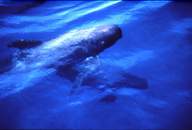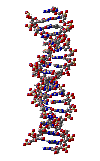|
Darwin’s limitations (04/2003)
The major features of evolution are pre-determined and not only the result of random or accidental processes, two leading European scientists propose in a paper published in the Journal of Theoretical Biology .
Professor Robert Williams of the University of Oxford and Professor Fraústo da Silva of the Instituto Superior Tecnico of Lisbon, challenge the Darwinist idea that the overall course of evolution is random and purposeless, and that the appearance of organisms with increasing complexity (including man) is ‘sheer luck’.
In a polemic argument likely to fuel the controversy of Intelligent Design – the idea of a hidden hand behind life as supported by Creationists - Williams, an Oxford Emeritus Professor of Inorganic Chemistry, and Fraústo da Silva, Professor of Analytic Chemistry, propose that evolution is directly influenced by the changes in the chemical environment. This theory snubs the Creationists’ major criticism of Darwin by explaining how evolution follows a trail of increasing complexity without relying on the existence of a ‘supernatural’ entity.
In an argument contributing to the ongoing debate about the origins of life, the two scientists claim that the path of evolution was scientifically unavoidable
Williams and Fraústo da Silva also affirm that the chemical organisation associated with life had to exist before the emergence of the genetic code: the genetic code was not the origin of life, but the written instructions of something that already existed. The code is necessary for reproductive life but it had to follow the changes in the environment.
This order of events disagrees with Darwinists that believe living machines began as passive receptacles for genes while providing protection against external aggression.
The two scientists write “chemicals exposed on Earth will also be driven towards such a steady state of optimal energy retention and maybe it was progress towards this state which forced life to start and then for evolution to proceed as it has done in a general inevitable way.”
An important prediction by Fraústo da Silva and Williams’ theory is that man’s manipulation of the chemical environment will no doubt influence the future of evolution. For immediate satisfaction we have created new chemical elements changing the chemical milieu, often irreversibly. Communication systems, new sources of energy - many times based on new chemicals - emerged. Chemical resources and space approach exhaustion. And the equilibrium of the open (energetic) system where we live is fragile. To Williams and Fraústo da Silva this is the last stage of chemical evolution. Now the question is how will these chemical changes affect the future of evolution. And this has to be taken in account if we want to survive.
Fraústo da Silva was the Founding Chancellor of the New University of Lisbon, and a former Portuguese Education Minister.
Williams is a Fellow of Britain’s Royal Society, which bestowed the same honour on Charles Darwin in 1839. He is a Fellow at Wadham College, Oxford, and formerly Napier Research Professor of the Royal Society.
Journal of Theoretical Biology (2003) vol 220, p323-343
Professor Fraústo da Silva - frausto.silva@ccb.pt
Professor Bob Williams - bob.williams@chemistry.oxford.ac.uk
|
In collaboration with the Observatório da Ciência e do Ensino Superior (OCES)
Financed by the Fundação para a Ciência e Tecnologia (FCT) |





